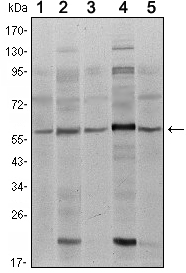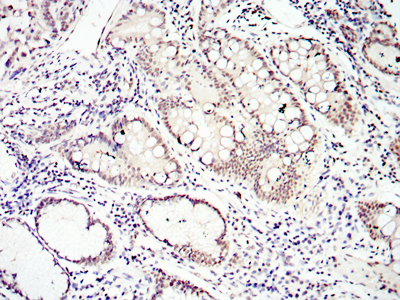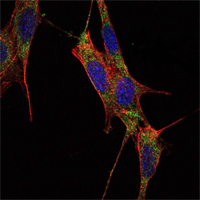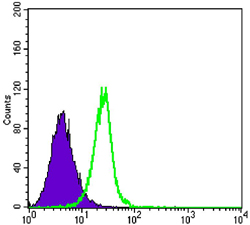Smad4 Monoclonal Antibody
- 货号:YM0583
- 应用:WB;IHC;IF;FCM;ELISA
- 种属:Human
- 简介:
- >>FoxO signaling pathway;>>Cell cycle;>>Wnt signaling pathway;>>TGF-beta signaling pathway;>>Apelin signaling pathway;>>Hippo signaling pathway;>>Adherens junction;>>Signaling pathways regulating pluripotency of stem cells;>>Th17 cell differentiation;>>AGE-RAGE signaling pathway in diabetic complications;>>Hepatitis B;>>Human T-cell leukemia virus 1 infection;>>Pathways in cancer;>>Colorectal cancer;>>Pancreatic cancer;>>Chronic myeloid leukemia;>>Hepatocellular carcinoma;>>Gastric cancer
- 蛋白名称:
- Mothers against decapentaplegic homolog 4
- 免疫原:
- Purified recombinant fragment of human Smad4 expressed in E. Coli.
- 特异性:
- Smad4 Monoclonal Antibody detects endogenous levels of Smad4 protein.
- 组成:
- Liquid in PBS containing 50% glycerol, 0.5% BSA and 0.02% sodium azide.
- 稀释:
- WB 1:500 - 1:2000. IHC 1:200 - 1:1000. IF 1:200 - 1:1000. Flow cytometry: 1:200 - 1:400. ELISA: 1:10000. Not yet tested in other applications.
- 纯化工艺:
- Affinity purification
- 储存:
- -15°C to -25°C/1 year(Do not lower than -25°C)
- 其他名称:
- SMAD4;DPC4;MADH4;Mothers against decapentaplegic homolog 4;MAD homolog 4;Mothers against DPP homolog 4;Deletion target in pancreatic carcinoma 4;SMAD family member 4;SMAD 4;Smad4;hSMAD4
- 背景:
- This gene encodes a member of the Smad family of signal transduction proteins. Smad proteins are phosphorylated and activated by transmembrane serine-threonine receptor kinases in response to TGF-beta signaling. The product of this gene forms homomeric complexes and heteromeric complexes with other activated Smad proteins, which then accumulate in the nucleus and regulate the transcription of target genes. This protein binds to DNA and recognizes an 8-bp palindromic sequence (GTCTAGAC) called the Smad-binding element (SBE). The Smad proteins are subject to complex regulation by post-translational modifications. Mutations or deletions in this gene have been shown to result in pancreatic cancer, juvenile polyposis syndrome, and hereditary hemorrhagic telangiectasia syndrome. [provided by RefSeq, Oct 2009],
- 功能:
- disease:Defects in SMAD4 are a cause of juvenile polyposis syndrome (JPS) [MIM:174900]; also known as juvenile intestinal polyposis (JIP). JPS is an autosomal dominant gastrointestinal hamartomatous polyposis syndrome in which patients are at risk for developing gastrointestinal cancers. The lesions are typified by a smooth histological appearance, predominant stroma, cystic spaces and lack of a smooth muscle core. Multiple juvenile polyps usually occur in a number of Mendelian disorders. Sometimes, these polyps occur without associated features as in JPS; here, polyps tend to occur in the large bowel and are associated with an increased risk of colon and other gastrointestinal cancers.,disease:Defects in SMAD4 are a cause of juvenile polyposis/hereditary hemorrhagic telangiectasia syndrome (JP/HHT) [MIM:175050]. JP/HHT syndrome phenotype consists of the coexistence of juvenile polyposis
- 细胞定位:
- Cytoplasm . Nucleus . Cytoplasmic in the absence of ligand. Migrates to the nucleus when complexed with R-SMAD (PubMed:15799969). PDPK1 prevents its nuclear translocation in response to TGF-beta (PubMed:17327236). .
- 组织表达:
- Fetal brain,Muscle,Placenta,

- Western Blot analysis using Smad4 Monoclonal Antibody against A431 (1), SK-N-SH (2), K562 (3), HepG2 (4) and HUVE12 (5) cell lysate.

- Immunohistochemistry analysis of paraffin-embedded lung cancer tissues with DAB staining using Smad4 Monoclonal Antibody.

- Immunofluorescence analysis of NIH/3T3 cells using Smad4 Monoclonal Antibody (green). Blue: DRAQ5 fluorescent DNA dye. Red: Actin filaments have been labeled with Alexa Fluor-555 phalloidin.

- Flow cytometric analysis of K562 cells using Smad4 Monoclonal Antibody (green) and negative control (purple).






